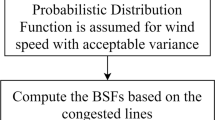Abstract
Congestion management (CM) work is a challenging task for researchers working in the field of power transmission sector. In this paper, an appreciable effort has been made to eliminate the line congestion by integrating wind farm in the system. To reschedule the conventional generators for achieving best optimal solution, moth flame optimization (MFO) algorithm is implemented here. Generator sensitivity factors and bus sensitivity factors are respectively used to reschedule the generators and to optimally locate the wind farm in deregulated power system. To test the performance and check the effectiveness of the proposed CM approach, modified IEEE 30 bus test system and modified 39 bus New England test system are used here. Further after obtained details results, the competitive performance of MFO algorithm is compared and verified with others optimization algorithms like artificial bee colony, firefly algorithm and ant lion optimizer algorithms in terms of rescheduling amount, rescheduling cost and active power losses.





Similar content being viewed by others
References
Afshar K, Ghiasvand FS, Bigdeli N (2018) Optimal bidding strategy of wind power producers in pay-as-bid power markets. Renew Energy 127:575–586
Biswas PP, Suganthan PN, Amaratunga GAJ (2017) Optimal power flow solutions incorporating stochastic wind and solar power. Energy Convers Manag 148:1194–1207
Deb S, Goswami AK (2012) Mitigation of congestion by generator rescheduling using particle swarm optimization. In: International conference on power and energy systems (ICPEN), pp 1–6
Dutta S, Singh SP (2008) Optimal rescheduling of generators for congestion management based on particle swarm optimization. IEEE Trans Power Syst 23(4):1560–1569
Esmaili M, Shayanfar HA, Amjady N (2010) Congestion management enhancing transient stability of power systems. Int J Appl Energy 87:971–981
Fattahi A, Ehsan M (2005) Sensitivity based re-dispatching method for congestion management in pool model. Int J Emerg Electr Power Syst 3(2):1–20
Ghazvini MAF, Lipari G, Pau M, Ponci F, Monti A, Soares J, Castro R, Vale Z (2019) Congestion management in active distribution networks through demand response implementation. Sustain Energy Grids Netw 17:1–13
Gope S, Goswami AK, Tiwari PK, Deb S (2016) Rescheduling of real power for congestion management with integration of pumped storage hydro unit using firefly algorithm. Electri Power Energy Syst 83:434–442
Gope S, Goswami AK, Tiwari PK (2017) Transmission congestion management using a wind integrated compressed air energy storage system. Eng Technol Appl Sci Res 7(4):1746–1752
Hajforoosh S, Nabavi SMH, Masoum MAS (2012) Coordinated aggregated-based particle swarm optimisation algorithm for congestion management in restructured power market by placement and sizing of unified power flow controller. IET Sci Meas Technol 6(4):267
Haque ANMM, Nijhuis M, Ye G, Nguyen PH, Bliek FW, Slootweg JG (2019) Integrating direct and indirect load control for congestion management in LV networks. IEEE Trans Smart Grid 10:741–751
Kotur D, Stefanov P (2019) Optimal power flow control in the system with offshore wind power plants connected to the MTDC network. Electr Power Energy Syst 105:142–150
Kumar A, Mittapalli RK (2014) Congestion management with generic load model in hybrid electricity markets with FACTS devices. Electr Power Energy Syst 57:49–63
Kumar A, Sekhar C (2013) Congestion management with FACTS devices in deregulated electricity markets ensuring loadability limit. Electr Power Energy Syst 46:258–273
Kumar A, Srivastava SC, Singh SN (2004a) A zonal congestion management approach using real and reactive power rescheduling. IEEE Trans Power Syst 19(1):554–561
Kumar A, Srivastava SC, Singh SN (2004b) A zonal congestion management approach using ac transmission congestion distribution factors. Electr Power Syst Res 72:85–93
Mirjalili S (2015) Moth-flame optimization algorithm: a novel nature-inspired heuristic paradigm. Knowl-Based Syst 89:228–249
Mohd Zin AA, Moradi M, Khairuddin A (2017) Short-term congestion management by strategic application of FACTS devices and demand response programs under contingency conditions. IETE J Res 63:109–123
Peesapati R, Yadav VK, Kumar N (2018) Flower pollination algorithm based multi-objective congestion management considering optimal capacities of distributed generations. Energy 147:980–994
Sarwar M, Siddiqui AS (2015) An efficient particle swarm optimizer for congestion management in deregulated electricity market. Int J Electr Syst Inf Technol 2:269–282
Singh SN, David AK (2001) Optimal location of FACTS devices for congestion management. Electr Power Syst Res 58:71–79
Singh JG, Singh SN, Srivastava SC (2016) Congestion management by using FACTS controller in power system. In: IEEE region 10 humanitarian technology conference, pp 1–7
Sood YR, Singh R (2010) Optimal model of congestion management in deregulated environment of power sector with promotion of renewable energy sources. Int J Renew Energy 35:1828–1836
Talukdar BK, Sinha AK, Mukhopadhyay S, Bose A (2005) A computationally simple method for cost-efficient generation rescheduling and load shedding for congestion management. Int J Electr Power Energy Syst 27(5):379–388
Verma S, Saha S, Mukherjee V (2018) Optimal rescheduling of real power generation for congestion management using teaching-learning-based optimization algorithm. Int J Electr Syst Inf Technol 5:889–907
Ye L, Zhang C, Xue H, Li J, Peng L, Zhao Y (2019) Study of assessment on capability of wind power accommodation in regional power grids. Renew Energy 133:647–662
Yesuratnam G, Thukaram D (2007) Congestion management in open access based on relative electrical distances using voltage stability criteria. Electr Power Syst Res 77:1608–1618
Zaeim-Kohan F, Razmi H, Doagou-Mojarrad H (2018) Multi-objective transmission congestion management considering demand response programs and generation rescheduling. Appl Soft Comput 70:169–181
Zimmierman RD, Sanchez CEM, Ga D (1997) MATPOWER. A matlab power system simulation package. http://www.pserc.cornell.edu/matpower
Author information
Authors and Affiliations
Corresponding author
Additional information
Publisher's Note
Springer Nature remains neutral with regard to jurisdictional claims in published maps and institutional affiliations.
Appendix
Rights and permissions
About this article
Cite this article
Gope, S., Goswami, A.K. & Tiwari, P.K. Transmission congestion management with integration of wind farm: a possible solution methodology for deregulated power market. Int J Syst Assur Eng Manag 11, 287–296 (2020). https://doi.org/10.1007/s13198-019-00856-z
Received:
Revised:
Published:
Issue Date:
DOI: https://doi.org/10.1007/s13198-019-00856-z




